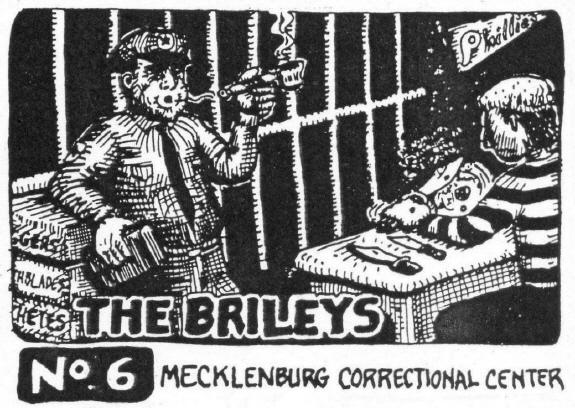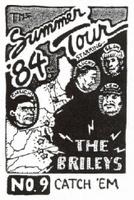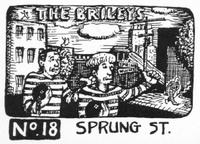By the time my daughter, Katey, was in high school two decades later, the culture had changed quite a bit. By then exotic fire arms and a potpourri of mind-bending drugs had become widely available, surely available to anyone with much of a desire to possess them, including kids.
Speaking of attractive dangers for kids, one particular episode from my daughter’s high school years stands out as a time when something awful could have happened ... but didn't.
The set up for a tragedy was certainly present. However, this time good luck prevailed.
Katey went to Open High, then situated at 00 Clay Street, in Richmond's Jackson Ward. At Open the students were encouraged to take a wide range of classes held in various locations. Some of those classes were taught by lay teachers.
Please note: As Katey received a good education at Open, the reader should not take it that any put-down of the school, itself, is intended with the telling of this story.
Anyway, a few blocks from the school’s downtown headquarters, there was a large, rather run down, warehouse-like building that was being rented out by-the-room as cheap housing, art studio space, and whatnot…
At this time, I was still somewhat plugged into the mid-town, artsy night life scene in town. So when colorful stories emanating from parties that had taken place in the aforementioned building began to circulate, they easily found their way to my ear. In that process, I found that my 15-year-old daughter had been seen at one of those parties.
When I inquired discreetly to learn more about the situation, my attention was soon drawn to a particular group that had been congregating in one of the building’s larger rooms. Apparently, the group saw themselves as members of a “philosophy club.” The club was headed up by a big-haired character who drove a cab. He also had a gig teaching an elective philosophy class at Open High. And, the class met regularly in the leader’s pad in the aforementioned building.
From what I could gather, his place had become something of an anytime hangout for a certain group of precocious teenagers. To learn more, I went to see the principal of Open, ostensibly to ask her some questions about me teaching a film-appreciation class there.
During our conversation, I inquired casually about the aforementioned philosophy class. Immediately, she became agitated. She asked me what I knew about that particular building and the so-called "philosophy club."
At that point I held back what I had heard. Instead, I asked her how much she knew about the club’s leader/teacher.
The worrisome details of what she blurted out next were similar to what I had been told. When I then confirmed that I had heard similar rumors the principal got more upset. She fretfully confided that she had already decided, earlier that day, to pull the plug on the edgy philosophy class.
While that was good news to me, I had to assume that move wouldn’t necessarily stop the most adventurous kids from continuing to hang out in that crumbling fortress, behind its locked doors. Which might include Katey.
So I decided I needed to pay a call on the self-styled pedagogue, holed up in his command post. However, it turned out that simple task proved harder than it should have been. In two or three tries, no one answered my knock on the entrance door.
Consequently, I left off a short message saying that I wanted to write an article about the club’s good work with alienated teenagers. The guy went for it and called me on the telephone. We set up a time for me to interview him.
First thing, the philosopher-in-chief gave me a tour of the huge, dungeon-like space. It had been years since I been inside that particular building; it struck me as worse looking than I had imagined. My tour guide assured me that most of the parents of the full members and novices were quite happy with him. He claimed they generally had faith that with his lessons he was truly connecting, in a positive way, with their hard-to-reach children.
Meanwhile, I wondered how many of those parents had actually been inside the building, but I didn't want to tip my hand too soon. Yes, the youngsters partied sometimes, he admitted with a twisted smile. But it was all happening under his enlightened supervision.
Furthermore, as part of their initiation into the club, the novices were also learning the value of hard work by gradually hauling off tons of the building’s ambient rubble. He boasted that the Libertarian in him then bartered their labor with the landlord, to pay his rent.
His rent!
That way he could channel more of the money the members raised, through their various projects, into video equipment and other such "philosophical" tools. By the time we got back to his desk, I had seen plenty and heard enough. Beyond that, no matter how alarmed, or not, one might have been about his convenient sense of morality, the dilapidated building itself, really was scary as all get-out.
In the guru’s point of view, it appeared he saw nothing intrinsically wrong with a creepy middle-aged man facilitating the corruption of 15-year-olds, all under the banner of legit schooling.
Sensing the time was right, I interrupted his self-serving presentation. Abruptly, my tone changed.
Borrowing from the hours of gangster movie footage I absorbed during my days as manager of the Biograph Theatre, I narrowed my eyes at the startled man, perhaps the way Humphrey Bogart or Robert Mitchem might look at a double-crosser.
Standing up from my chair I explained to him that I wasn’t there to bring him trouble over whatever illegal shenanigans had already gone on in there. What I was there to say was that I did not want MY daughter in THAT building again.
Without raising my voice, I said from that moment on, I would hold him -- "personally" -- accountable. Yes, he probably felt that the threat of bodily harm had just been implied.
Satisfied that the speechless philosopher had gotten the message, I left directly. I certainly didn't want to stretch my tough guy impersonation too thin.
Later that day, I met with Katey to tell her about my visit to the warehouse. In so many words, I said I now had good reason to believe the philosophy club’s professor was a garden-variety child molester -- a sicko who was using access to drugs and the building’s tomb-like privacy to lure children away from all scrutiny.
While Katey objected to a few of my characterizations and interpretations, she couldn’t deny that some of it was probably accurate. Moreover, she was absolutely forbidden to go in the place again. Of course, I knew she could do as she pleased, so I hoped for the best.
Subsequently, when the warehouse fakir told his followers that Katey Rea must be kept out, well, some members took it to mean she was a squealer. That became a bigger problem when the school’s principal called the cops days later, to investigate the whole mess.
Because I had been spotted by club members, when I paid my courtesy call on their leader, they jumped to the conclusion that Katey’s father was the whistle-blower; she was blamed for their trouble. Which was mostly a bum rap, because we hadn't discussed it until after my visit to the philosopher's den, but the "squealer" label stuck for a while.
It wasn’t much longer before the philosophy club, itself, was 86ed from the warehouse. The cab-driver faded away.
In the short run, Katey paid a bitter price for the clumsy moves her father made in his effort to protect her. She endured being ostracized from the cool kids group for a while. Not easy for a 15-year-old.
Still, we were all lucky. Some of those kids may have learned a lesson the hard way, but there were no funerals I know of. Katey learned firsthand something about the vagaries of in-crowd cliques.
When this episode was unfolding, I was improvising. Doing what my instincts told me was right. But since it did cause Katey some trouble, I worried for a good while that I probably should have handled it differently.
No doubt, some parents would have done nothing and hoped for the best. Others would have called the cops. Still others would have tried to be the boss and immediately changed their daughter's school. Knowing that any strategy I tried to impose on the situation could backfire, I followed my instincts to take decisive action, by moving directly toward the source of the problem.
Bottom line: OK, this piece mostly circles around imagining what bad things did not happen. Looking back on this story, I still think the solution wasn't worse than the problem was.
I hope so.














